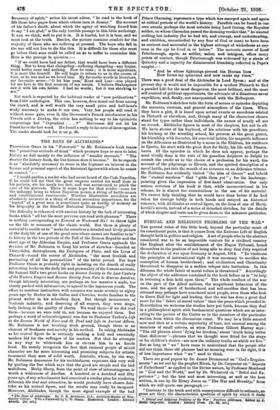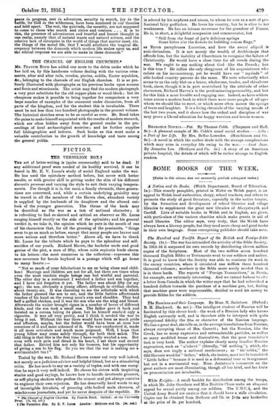ETHICAL AND RELIGIOUS PROBLEMS OF THE WAR.* THE general value
of this little book, beyond the particular merit of its constituent parts, is that it comes from the Extreme Left of English thought both in politics and religion. A set of people who in the abstract considered war to be an impossible venture for a civilized country like England after the establishment of the Hague Tribunal, found themselves in the position of not being able to deny that duty required the declaration of war upon Germany in August, 1914. " To vindicate the principles of international right it was necessary to sacrifice the conception of human brotherhood ; and civilization and Christianity threatened to disappear in a sudden relapse into barbarism. In this dilemma the whole fabric of moral values is threatened." Accordingly the object of the addresses contained in the book before us is " to help in restoring a firm hold upon them." The whole conduct of the war on the part of the Allied nations, the magnificent behaviour of the men, and the spirit of brotherhood and self-sacrifice that has been released may perhaps have convinced most people, even those who look to Essex Hall for light and leading, that the war has done a great deal more for the " fabric of moral values" than the peace which preceded it. Nevertheless we welcome the studies here put forth, because they deal in a philosophical spirit with fundamental questions which are as inter- esting to the parties of the Centre as to the members of the particular section from which the discussions come. We may be a little amused now and then at a certain superiority of tone, not unusual among the members of small coteries, as when Professor Gilbert Murray says " The old phrases about dying for freedom,' about ' death being bettor than dishonour '—phrases that we thought were fitted for the stage or for children's stories—are now the ordinary truths on whioh we live." But so long as " we " have come to understand that the people who did not think these old phrases had no meaning were in the right, it is of less importance what " we " used to think.
There are good papers by Dr. James Drummond on " God's Require- ments " as set out by the prophet Micah, by Dr. Carpenter on " Aspects of Fatherhood" as applied to the Divine nature, by Professor Muirhead on " God and the World," and by Dr. Wicksteed on " Belief and Ex- perience " ; - but the best and most interesting, as well as the best written, is one by Sir Henry Jones on " The War and Morality," from which we will quote one paragraph :— "Contrary to the truth and with consequences difficult to estimate, sa great are they, the characteristic qualities of spirit by which it finds
• Ethical and Religious Probknat of the War : Fourteen Addresses. Edited by J. BstJla Carpenter. Loudon : Lindsey Press. 12a. Oct net.] Mein, rest in adventure, security in search, ley in the lee, its in the wilderness, have been sundered in our theories and held apart. The rest, the quietude, the security, are not supposed to come to those who search and strive and venture. . . . It is to this, the presence of adventurous and trustful and honest thought in one realm, namely that of natural wants and natural science, and the relative lack of enterprise in the world of things that matter meet, viz. the things of the moral life, that Z would attribute the tragical dis- crepancy between the demands which modern life makes upon us, and the ethical response we are able to make to these demands."



































 Previous page
Previous page